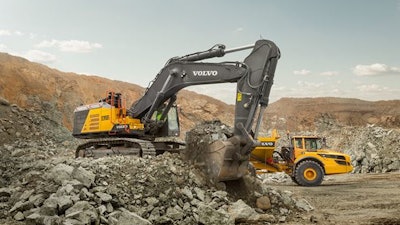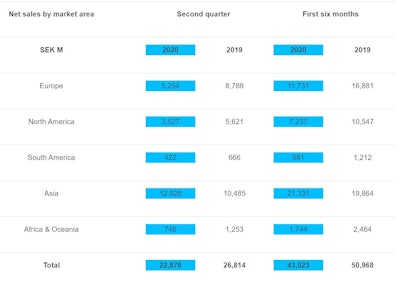
In the second quarter of 2020, the Volvo Group’s net sales amounted to SEK 73,227 M compared with SEK 120,694 M in the same quarter the preceding year. Adjusted for currency movements, net sales decreased by 38%. The adjusted operating income amounted to SEK 3,272 M (15,105), corresponding to an adjusted operating margin of 4.5% (12.5).
“The second quarter of 2020 was characterized by the COVID-19 pandemic and its negative effects on society and economic development,” said Martin Lundstedt, President and CEO, Volvo Group. “Measures adopted by countries to control the spread had a significant impact on our production and supply chain, as well as on demand for our products and services. Our net sales decreased by 39% to SEK 73.2 billion.
“After having been standing still in April, production was gradually restarted in May and is currently running well thanks to great efforts by our colleagues and suppliers,” he continued. “We also took forceful actions to reduce activities and costs, including salary reductions, temporary layoffs as part of governmental programs and a reduction of purchased services. All of these activities contributed to the Volvo Group achieving an adjusted operating income of SEK 3.3 billion (15.1) with a margin of 4.5% (12.5).”
COVID-19-related effects had severe impacts on both sales and earnings:
- In Q2 2020, net sales amounted to SEK 73.2 billion (120.7). Adjusted for currency movements, net sales decreased by 38%.
- Adjusted operating income amounted to SEK 3,272 M (15,105), corresponding to an adjusted operating margin of 4.5% (12.5).
- Reported operating income amounted to SEK 388 M (15,105).
- Operating income in Q2 includes restructuring charges of SEK 3,200 M related to the previously announced cost-reduction measures, which are expected to generate annual savings in the same magnitude with the majority taking effect during the first half of 2021.
- Currency movements had a positive impact on operating income of SEK 341 M.
- Diluted earnings per share amounted to SEK -0.14 (+5.47).
- Operating cash flow in the Industrial Operations was negative in an amount of SEK 5,718 M (positive SEK 13,867 M).
Construction Equipment Sales Hit But Orders Up
Volvo Construction Equipment saw adjusted net sales in the second quarter decrease by 14%, amounting to SEK 22,876 M (SEK 26,814 M in Q2 2019). Higher sales in China did much to compensate for lower sales in all other markets. Operating income was also impacted in Q2. At 3,108 M, it was down from the 4,153 reported in the same period the year before, equating to an operating margin of 13.6% (15.5%).
 Table 1. Volvo Construction Equipment, net sales by market area, in Millions of Swedish Krona (SEK)
Table 1. Volvo Construction Equipment, net sales by market area, in Millions of Swedish Krona (SEK)
The year up to the end of May saw both the European and North American markets, measured in units, shrink by 22%, while the Asian market (excluding China) reduced by 21%. The Chinese market has recovered strongly and was up 13% at the end of May. The South American market was also in positive territory, up by 8% at the same point in the year.
“While demand for construction equipment in both Europe and North America was weak during the second quarter we were able to leverage our strong position in China, which rebounded strongly in the period,” commented Melker Jernberg, head of Volvo Construction Equipment. “This is allowing us to act from a position of relative strength and to drive transformational technologies that are moving our industry to more sustainable solutions. We are continuing to invest in electrification, automation and connectivity.”
Ongoing Steps to Move Forward
Lundstedt foresees ongoing challenges moving forward stemming from the pandemic in combination with traditional market forces. “Since the record levels in Q2 of last year, demand has declined as part of a normal cyclical slowdown, something that was significantly accelerated by the pandemic,” he indicated. “We expect demand to continue to be negatively affected in the short and medium term because of the lower economic activity in many markets and the fact that the truck and machine populations are relatively young.”
The company plans to continue short-term cost reduction activities, including previously announced workforce reductions and other measures.
“In these challenging times, we continue to focus on our colleagues, customers and business partners, cash flow and cost,” Lundstedt stated. “By securing our current performance, we will be able to take the lead in the transformation into sustainable transport and infrastructure solutions for the future.”

















